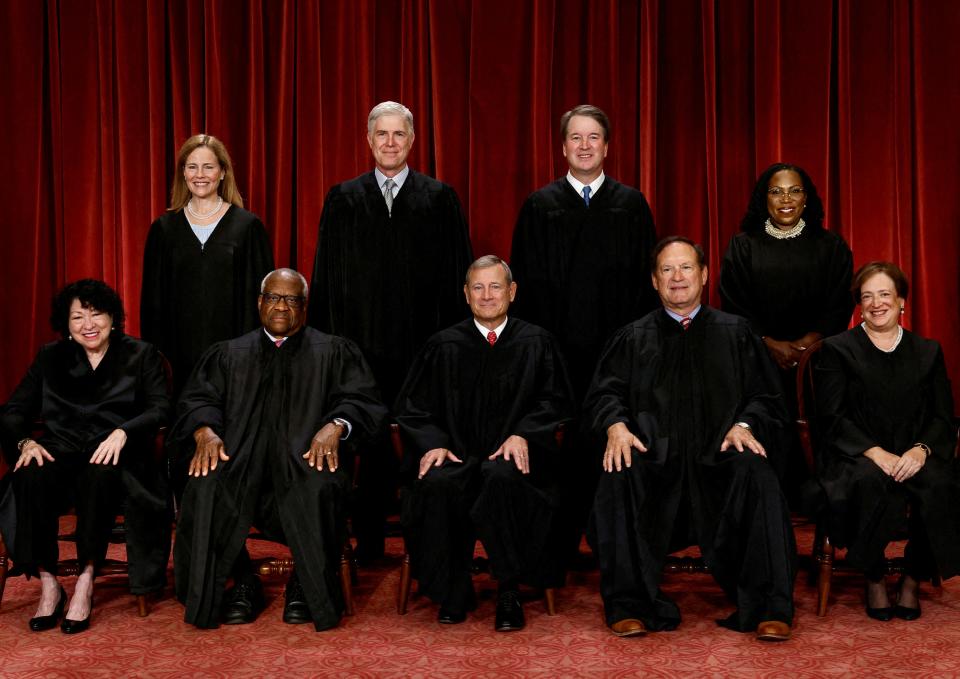SCOTUS decisions will fuel conservative ambition. Pay attention to our democracy: Our view
- Oops!Something went wrong.Please try again later.
- Oops!Something went wrong.Please try again later.
- Oops!Something went wrong.Please try again later.
A remarkable term for the United States Supreme Court concluded this week. Its impacts — on the prospects of former President Donald Trump’s campaign for a new term, on the powers of the federal government and on issues including guns, abortion and pollution — will send shockwaves across American life.
This term’s rulings — made in more major cases than in any recent term — represent a broad victory for American conservatives, who have long coveted a majority on the court with the hopes that its social and political agendas could be bolstered and expanded. The court issued decisions that disarmed federal regulatory powers, upended Biden administration efforts to address climate change and impacted a case federal prosecutors are making against Trump for his role in the Jan. 6 riot at the U.S. Capitol.
Chief Justice John G. Roberts used the term to reassert the court’s powerful position in the national conversation, navigating past a host of ethics questions and enduring backlash over the 2022 ruling that destroyed the constitutional right to abortion. Roberts and his conversative colleagues acted with ambition this term, delivering consequential rulings that represent decades of conservative aspiration.
A consequential term for America's conservative agenda

Conservative dreams — some held for more than 40 years — are translating into American reality.
Consider:
Immunity for presidents: Ruling in Trump v. United States, The court found that Trump is partly immune from prosecution on federal charges that he worked to subvert the results of the 2020 election. The ruling essentially found that presidents may be prosecuted for private conduct, but not for acts in office.
Federal agencies’ powers: Ruling in Loper Bright Enterprises v. Raimondo and Relentless v. Department of Commerce, the court broadly reduced regulatory powers granted to federal agencies to manage policies regarding health care, consumer safety, the environment, nuclear energy, guns and more. This decision upsets a foundational 1984 precendent sent by the court in Chevron v. Natural Resources Defense Council, which required courts to defer to agencies’ interpretations of ambiguous statutes.
Cross-state air pollution: Ruling in Ohio v. Environmental Protection Agency, the court temporarily stopped a Biden administration effort called the “good neighbor” plan, which would have required factories and power plants in western and midwestern states to cut emissions that drift to create air pollution in Eastern and Northeastern states.
Graphic: From the Chevron rule to Trump's immunity, how the Supreme Court voted in recent rulings
How do Americans feel about these rulings? How will they impact your vote?
These rulings — and others made this term — are likely to have broad impacts this year and well beyond. In many cases, researchers from Harvard, Stanford and the University of Texas, found that court’s decisions this term were well out of step with public opinion.
SCOTUSPoll, conducted in March, found that, for instance, 74% of Americans believe former presidents should not be immune from criminal prosecution for actions they took while in office.
We encourage readers to immerse themselves in this term’s rulings and to consider them against the backdrop of an already-chaotic presidential election.
Opinion: You probably missed this Supreme Court decision. It will change how government works.
This week’s reaction to President Joe Biden’s performance in the June 27 presidential debate may imperil the incumbent’s candidacy for a new term. Trump, meanwhile, remains enmeshed in his many legal battles — and, this week, learned that his sentencing on 34 felony charges in his New York hush-money case was delayed until September. Why? His attorneys argued they needed time to assess the court’s immunity ruling and its potential impacts on Trump’s case. Indeed, the ruling may impact the federal charges Trump faces in multiple cases.
Put simply, it seems increasingly likely that norms of American democracy — the way the presidency has functioned and the way federal agencies can operate, to say the least — may be vastly different no matter who secures a new term in the White House next year.
Meanwhile, with the presidency, an ascendant conservative movement — buoyed surely by the court's decisions as the term concluded — is increasingly beholden to Project 2025, a Heritage Foundation effort that vows to "lay the groundwork for a White House more friendly to the right." Among Project 2025's many proposal include efforts to drastically reshape federal agencies with vast regulatory powers. Some of the proposals, we believe, could propel the presidency and federal power even further from accepted norms of American representative democracy. Readers should work to understand this agenda and how it could be put to quick use in a second Trump administration.
We encourage our readers, as ever, to engage with the news of the day and to act with all the factual information they can gather to make informed and thoughtful decisions at the ballot box come November.
As is increasingly clear, this election will be consequential.
This article originally appeared on NorthJersey.com: SCOTUS decisions 2024: Wins fuel conservative ambitions

